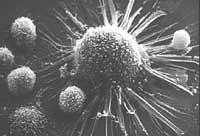An AIDS protein prevents cell proliferation and increases disease
Against viruses and bacteria, T cells are among the most effective defenses in the body. However, when encountering AIDS, these cells become a focus for the virus. Once infected, T cells generate AIDS. The Gladstone Institute of Immunology and Virology has explained how AIDS turns your T cells into a servant.

The core of the research is the AIDS Vpr protein. This protein prevents the proliferation of T cells and facilitates the reproduction of AIDS. This process generates more aids-contaminated cells that kill T cells again. This explains why AIDS occurs so quickly in humans.
Research has shown that T cells under AIDS control not only do not reproduce but remain in a phase called G2. This phase is more suitable for the proliferation of AIDS and the Vpr protein has a great influence on the capture of the G2 phase. If it is shown that the arrest positively affects the reproduction of AIDS, we would be facing another goal against the disease.
The discovery was made using a technique capable of detecting contaminated cells. Every aids-infected cell contains a protein called p24 that is detected by a fluorescent antibody. This technique provides a window of visualization of contaminated cells, so future research will target the level of cells.





